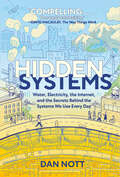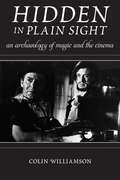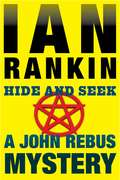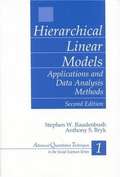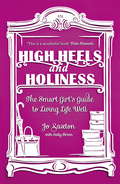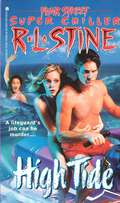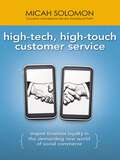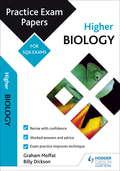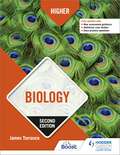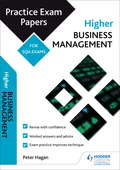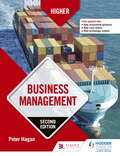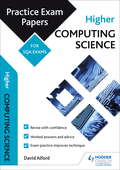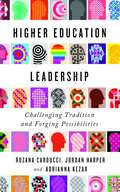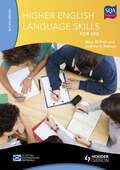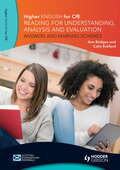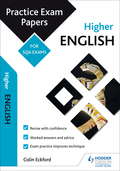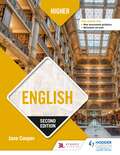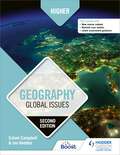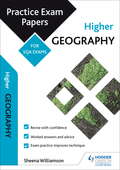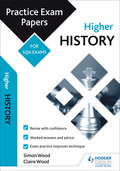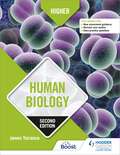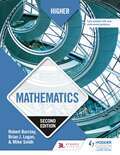- Table View
- List View
Hidden Systems: Water, Electricity, the Internet, and the Secrets Behind the Systems We Use Every Day (A Graphic Novel)
by Dan NottWe use water, electricity, and the internet every day--but how do they actually work? And what&’s the plan to keep them running for years to come? This nonfiction science graphic novel takes readers on a journey from how the most essential systems were developed to how they are implemented in our world today and how they will be used in the future.What was the first message sent over the internet? How much water does a single person use every day? How was the electric light invented?For every utility we use each day, there&’s a hidden history--a story of intrigue, drama, humor, and inequity. This graphic novel provides a guided tour through the science of the past--and reveals how the decisions people made while inventing and constructing early technology still affect the way people use it today.Full of art, maps, and diagrams, Hidden Systems is a thoughtful, humorous exploration of the history of science and what needs to be done now to change the future.
Hidden in Plain Sight
by Colin WilliamsonWhat does it mean to describe cinematic effects as "movie magic," to compare filmmakers to magicians, or to say that the cinema is all a "trick"? The heyday of stage illusionism was over a century ago, so why do such performances still serve as a key reference point for understanding filmmaking, especially now that so much of the cinema rests on the use of computers? To answer these questions, Colin Williamson situates film within a long tradition of magical practices that combine art and science, involve deception and discovery, and evoke two forms of wonder--both awe at the illusion displayed and curiosity about how it was performed. He thus considers how, even as they mystify audiences, cinematic illusions also inspire them to learn more about the technologies and techniques behind moving images. Tracing the overlaps between the worlds of magic and filmmaking, Hidden in Plain Sight examines how professional illusionists and their tricks have been represented onscreen, while also considering stage magicians who have stepped behind the camera, from Georges Méliès to Ricky Jay. Williamson offers an insightful, wide-ranging investigation of how the cinema has functioned as a "device of wonder" for more than a century, while also exploring how several key filmmakers, from Orson Welles to Christopher Nolan and Martin Scorsese, employ the rhetoric of magic. Examining pre-cinematic visual culture, animation, nonfiction film, and the digital trickery of today's CGI spectacles, Hidden in Plain Sight provides an eye-opening look at the powerful ways that magic has shaped our modes of perception and our experiences of the cinema.
Hide and Seek: An Inspector Rebus Mystery (Inspector Rebus #2)
by Ian RankinThe second novel in the "superior series" (The New York Times Book Review) featuring Inspector John Rebus—from one of "the best crime novelists at work today" (Michael Connelly).A junkie, dead in an Edinburgh squat, the body laid out with ritual precision. A girl with a past, running wild and running scared. But who cares? These are the dregs, a squalid society of addicts and derelicts, people long since disconnected from a society that is preoccupied with the new businesses and the new homes bringing prosperity to a city concentrating on advertising its quality of life. Only Detective Inspector John Rebus senses something evil, something too dangerous to ignore that has to be investigated and brought up into the light. Something that may prove to be very closely connected indeed to the bright new world above. It is an investigation that will find him not just trying to solve a crime but fighting for his life.
Hierarchical Linear Models: Applications and Data Analysis Methods (2nd Edition)
by Anthony S. Bryk Stephen W. RaudenbushThe first edition of this book was a bestseller. Now the author has added four more completely new chapters to this second edition.
High Heels and Bound Feet and Other Essays on Everyday Anthropology
by Roberta Edwards LenkeitAccording to the author, seeing life through the multifaceted lens of anthropology makes living more rewarding and adds meaning to how we see and experience our world. A committed educator and seasoned author, Lenkeit serves up 22 concise, attention-grabbing essays to demonstrate how core anthropological concepts can be easily applied to everyday life in this highly original, single-authored collection. While the essays focus on cultural anthropology, the inclusion of topics on linguistics, biological anthropology, and archaeology brings attention to the holistic nature of the discipline and contributes to the book's course versatility. All essays conclude with material useful for assimilating content: "Thinking It Through," "Anthropological Terms," and "Thinking Practically." Lenkeit channels Margaret Mead, a major force in popularizing the field and its everyday potential. The lucid, engaging essays in High Heels and Bound Feet will pique readers' interest as they discover how anthropology informs, energizes, and infuses their lives every day.
High Heels and Holiness: The Smart Girl's Guide to Living Life Well
by Jo Saxton Sally Breen'With their usual warmth and honesty, Jo and Sally tackle tricky subjects head-on, giving sound advice and wisdom that is firmly rooted in real life. This book is a joy to read' Ali Martin, Soul SurvivorSociety has no problem telling women what they should be. It determines their dreams and expectations, and dictates how they should feel about their image, relationships and career. So how do we do life - friendship, money, men and the rest - with wisdom and integrity? As Christian women, where is our place in today's culture? How do we embrace life and live it to the full?In HIGH HEELS AND HOLINESS Jo Saxton and Sally Breen get to grips with all these questions, giving a friendly, practical guide to being a faithful disciple in today's world - high heels and all.
High Tide (Fear Street Superchillers #12)
by R.L. StineAdam Malfitan still has nightmares about the night his girlfriend, Mitzi, died. He sees the blood. He sees her in the water. He is a lifeguard, and he can’t save her. He wakes up screaming, but the terror is just beginning.
High-Tech, High-Touch Customer Service: Inspire Timeless Loyalty in the Demanding New World of Social Commerce
by Micah SolomonTwitter, smartphones, and self-service kiosks are taking over, and tech-savvy business dealings are no longer an advantage--they’re a requirement. With entertaining humor and inarguable logic, author Micah Solomon offers surefire strategies for success by exploring the timelessness of customer service (i.e., what hasn’t changed), the high-tech tools that could give you a customer service advantage, and the systemic social shifts that are changing your customer’s expectations of the way you do business. You’ll learn inside secrets of wildly successful customer service initiatives, from internet startups to venerable brands, and how to turn casual customers into fervent supporters who will spread the word far and wide--online and off. High-Tech, High-Touch Customer Service does this by teaching readers the six major customer trends and what they mean for business; the eight unbreakable rules for social media customer service; how to effectively address online complainers and saboteurs on Yelp, Twitter, TripAdvisor, and other forums; how to understand and leverage the rising power of self-service; and how to build a company culture that breeds stellar customer service.With special features including lessons from the latest newsworthy customer service blunders, you’ll be equipped to retool old-fashioned customer service and turn time-strapped, screen-addicted, value-savvy, and socially engaged critics into fervent loyal customers who help your business thrive.
Higher Biology: Practice Papers for SQA Exams
by Graham Moffat Billy DicksonPractise for your SQA exams with three specially-commissioned Hodder Gibson Practice Exam Papers.- Practise with model papers written and checked by experienced markers and examiners- Get extra advice with specially-written study-skills guidance sections- Gain vital extra marks and avoid common mistakes with examiner tips
Higher Biology: Second Edition
by James Simms Clare Marsh Caroline StevensonExam Board: SQALevel: HigherSubject: BiologyFirst Teaching: August 2018First Exam: June 2019Ensure that students are prepared for every aspect of Higher Biology with the new edition of this popular textbook from James Torrance and his renowned author team, completely updated for the 2018 changes to the SQA Higher Biology syllabus.- Suggested learning activities throughout help to develop students' knowledge and skills including all new case studies, research topics and investigations- Testing your knowledge questions at the end of each chapter provide opportunities to continually assess Knowledge and Understanding, and are particularly useful for homework tasks- 'What you should know' summaries of key facts and concepts provide an excellent source of material for consolidation and revision prior to the SQA examination.- 'Applying Your Knowledge and Skills' sections at the end of each section have been substantially extended to give students extra practice in exam questions and foster the development of Skills of Scientific Experimentation, Investigation and Enquiry
Higher Business Management: Practice Papers for SQA Exams
by Peter HaganPractise for your SQA exams with three specially-commissioned Hodder Gibson Practice Exam Papers.- Practise with model papers written and checked by experienced markers and examiners- Get extra advice with specially-written study-skills guidance sections- Gain vital extra marks and avoid common mistakes with examiner tips
Higher Business Management: Second Edition
by Peter HaganExam Board: SQALevel: HigherSubject: BusinessFirst Teaching: August 2018 First Exam: June 2019The comprehensive textbook for the updated Higher Business Management course, written by a highly experienced author, teacher and examiner.- Provides full and authoritative coverage of the updated SQA Higher Business Management syllabus, including all new Technology sections- Supports students with material and advice for completing coursework- Helps students to test their knowledge and measure progress with a wealth of further revision and end-of-section assessment questions- Contains a wide variety of report and research tasks to reinforce key topic areas- Keeps students right up to date with case studies and analysis of leading business concerns, practices and objectives and uses terminology from International Accounting Standards throughout
Higher Chemistry: Second Edition Epub
by John AndersonExam Board: SQALevel: HigherSubject: ChemistryFirst Teaching: August 2018First Exam: June 2019Full course coverage in this new Higher Chemistry textbook, updated for the latest changes to the SQA coursework and question papers.- In-text, Study and End-of-course questions have been updated and extended in this edition, testing students' knowledge and understanding of the chemistry presented and offering lots of practice to revise and consolidate ahead of the exam.- Worked examples show common Higher Chemistry questions and ways of answering that cover the necessary points- Checklists for Revision provide short summaries of the key learning points at the end of each chapter so that students can this to self-check their learning which helps them revise for assessments- Brand new section 'Additional features of the Higher Chemistry exam' offers advice on how to tackle two important new features of the exam: Numeracy and Open-ended questions- Key terms and Chemical Dictionary aid understanding and allow students to check their knowledge of the key terms
Higher Computing Science: HCOMPPEP
by David AlfordPractise for your SQA exams with three specially-commissioned Hodder Gibson Practice Exam Papers.- Practise with model papers written and checked by experienced markers and examiners- Get extra advice with specially-written study-skills guidance sections- Gain vital extra marks and avoid common mistakes with examiner tips
Higher Education Leadership: Challenging Tradition And Forging Possibilities
by Rozana Carducci Jordan Harper Adrianna KezarHigher English Language Skills for CfE
by Andrew G. Ralston Mary M. FirthThis is a brand new edition of a bestselling title, updated for the newest CfE Higher English course, and particularly directed at offering support for Paper 1: Reading for Understanding, Analysis and Evaluation. It provides you with the support and advice you will need to succeed in this element of Higher English, which is worth 30% of the available marks in your examination.- Become more secure in your knowledge of the English language and in your reading skills- Apply those reading skills in learning how to answer questions on close reading- Practise answering questions and check your work using theaccompanying book of suggested answers
Higher English for CfE: Reading for Understanding, Analysis and Evaluation
by Ann Bridges Colin EckfordA brand new edition of the former Higher English Close Reading, completely rewritten for the new Higher element - worth 30% of marks in the final exam. Written by two highly experienced authors, this book shows you how to practise for the Reading for Understanding, Analysis and Evaluation section of the CfE Higher English exam. It introduces the terms and concepts that lie behind success and offers guidance on the interpretation of questions and targeting answers.- Acquire and improve the skills needed for success in this area of CfE Higher- Includes questions and passages to reflect the style of assessments in this section of the paper- Revise for the exam using the practice papers and accompanying book of suggested answers
Higher English for CfE: Reading for Understanding, Analysis and Evaluation - Answers and Marking Schemes
by Ann Bridges Colin EckfordThis book (which is photocopiable within the purchasing institution) provides detailed suggested marking instructions to use alongside the student book of the same name, which offers practice in the Higher element of Reading for Understanding, Analysis and Evaluation - worth 30% of marks in the final exam. Written by two highly experienced authors, the student book introduces the terms and concepts that lie behind success and offers guidance on the interpretation of questions and targeting answers. - Acquire and improve the skills needed for success in this area of CfE Higher - Detailed marking instructions to reflect the style of assessments in this section of the paper - Revise for the exam using the practice papers in the accompanying student book
Higher English: Practice Papers for SQA Exams
by Colin EckfordPractise for your SQA exams with three specially-commissioned Hodder Gibson Practice Exam Papers.- Practise with model papers written and checked by experienced markers and examiners- Get extra advice with specially-written study-skills guidance sections- Gain vital extra marks and avoid common mistakes with examiner tips
Higher English: Second Edition
by Jane CooperExam Board: SQALevel: HigherSubject: EnglishFirst Teaching: August 2018First Exam: June 2019Ensure your students are prepared for every aspect of their assessment with the only textbook that offers comprehensive coverage of the updated syllabus requirements. - Written by a highly experienced bestselling author- Covers the updated specification with all the new topics in the SQA examinations- Provides thorough exam preparation, with graded Practice Exercises- Organised to make it easy to plan, manage and monitor student progress
Higher Geography: Global Issues, Second Edition
by Ian Geddes Calum CampbellExam Board: SQALevel: HigherSubject: GeographyFirst Teaching: August 2018First Exam: June 2019 This book is a complete guide to the most popular options in the Global Issues area of the CfE Higher Geography course. - Blends theoretical content and processes with detailed guidance on practical aspects - Offers geographical perspectives on environmental and social issues and their significance - Encourages students to interact with their environment and develop an interest in, understanding of, and concern for the environment and sustainable development - Provides exam style questions in every chapter and new, contemporary case studies and exemplars for a fresh and inspirational examination of well-known geographical themes A companion volume, Higher Geography: Physical and Human Environments: Second Edition, provides material for the other areas of the course.
Higher Geography: Practice Papers for SQA Exams
by Sheena WilliamsonPractise for your SQA exams with three specially-commissioned Hodder Gibson Practice Exam Papers.- Practise with model papers written and checked by experienced markers and examiners- Get extra advice with specially-written study-skills guidance sections- Gain vital extra marks and avoid common mistakes with examiner tips
Higher History: Practice Papers for SQA Exams
by Claire Wood Simon WoodPractise for your SQA exams with three specially-commissioned Hodder Gibson Practice Exam Papers.- Practise with model papers written and checked by experienced markers and examiners- Get extra advice with specially-written study-skills guidance sections- Gain vital extra marks and avoid common mistakes with examiner tips
Higher Human Biology: Second Edition
by James Simms Clare Marsh Caroline StevensonExam Board: SQA Level: Higher Subject: Human Biology First Teaching: August 2018 First Exam: June 2019Ensure that students are prepared for every aspect of Higher Human Biology with the new edition of this popular textbook from James Torrance and his renowned author team, completely updated for the 2018 changes to the SQA Higher Human Biology syllabus.- Suggested learning activities throughout help to develop students' knowledge and skills including all new case studies, research topics and investigations- 'Testing your knowledge' questions at the end of each chapter provide opportunities to continually assess Knowledge and Understanding, and are particularly useful for homework tasks- 'What you should know' summaries of key facts and concepts provide an excellent source of material for consolidation and revision prior to the SQA examination.- 'Applying Your Knowledge and Skills' sections at the end of each section have been substantially extended to give students extra practice in exam questions and foster the development of Skills of Scientific Experimentation, Investigation and Enquiry
Higher Mathematics: Second Edition
by Robert Barclay Mike Smith Brian LoganThe complete textbook for the SQA Higher Maths course, updated in accordance with latest syllabus guidelines.- Arranged by topic, but with complete flexibility to teach in preferred order - Unique 'hinge-point' questions to test readiness to progress further in each topic - or go back and revise - Written by three outstanding and experienced teachers, examiners and authors
